Herbal remedies offer natural solutions for managing anxiety and providing emotional support. They promote relaxation, enhance mood, and can reduce stress with ingredients like chamomile and ashwagandha. Individual responses to these herbs can vary, influenced by personal health factors and lifestyle choices. Lesser-known options, such as lemon balm and passionflower, also contribute to anxiety relief and emotional balance.
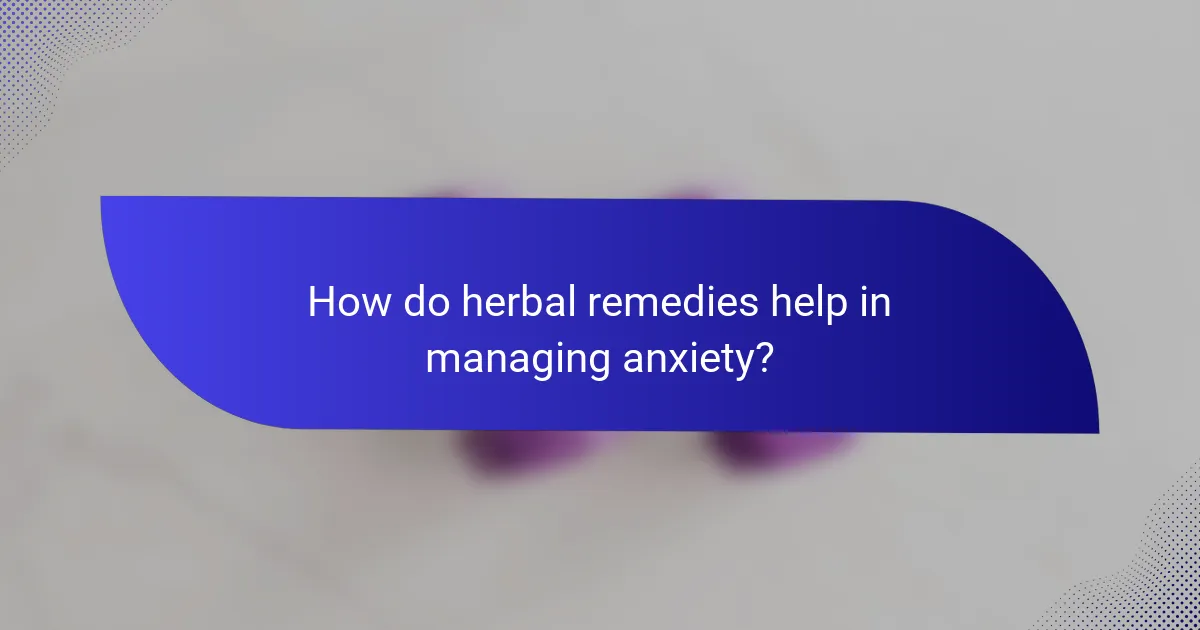
How do herbal remedies help in managing anxiety?
Herbal remedies effectively manage anxiety by promoting relaxation and emotional balance. Ingredients like chamomile and lavender contain compounds that reduce stress and improve mood. Research shows that these herbs can lower cortisol levels, enhancing overall mental well-being. Additionally, valerian root is known for its calming effects, aiding sleep and reducing anxiety symptoms.
What are the most common herbal remedies for anxiety?
Herbal remedies commonly used for anxiety include chamomile, lavender, valerian root, passionflower, and lemon balm. These herbs are known for their calming effects and ability to promote emotional support.
Chamomile is often consumed as tea and may help reduce anxiety symptoms due to its mild sedative properties. Lavender can be used in essential oils or teas and is recognized for its relaxing aroma. Valerian root is known for its ability to improve sleep quality, thus indirectly aiding anxiety relief. Passionflower is frequently used for its calming effects and is available in various forms, including tinctures and teas. Lemon balm is another popular choice, often found in teas, known for its ability to reduce stress and improve mood.
These herbal remedies offer a natural approach to managing anxiety and supporting emotional well-being.
How do herbal remedies compare to conventional treatments?
Herbal remedies can offer a complementary approach to conventional treatments for anxiety management and emotional support. They often involve natural ingredients, such as chamomile or valerian root, known for their calming effects.
In contrast, conventional treatments typically rely on pharmaceuticals, which may provide quicker relief but can also lead to side effects. Herbal remedies generally have fewer side effects, making them appealing to those seeking natural alternatives.
Herbal remedies may take longer to show effects, often requiring consistent use over time. However, they can promote overall well-being and emotional balance. Users often report improved mood and reduced anxiety levels with regular intake.
A comparison of key attributes highlights these differences:
| Attribute | Herbal Remedies | Conventional Treatments |
|————————–|————————|————————-|
| Onset of Action | Gradual | Rapid |
| Side Effects | Minimal | Possible |
| Long-term Use | Generally safe | Requires monitoring |
| Natural Ingredients | Yes | No |
| Cost | Typically lower | Often higher |
| Accessibility | Widely available | Prescription required |
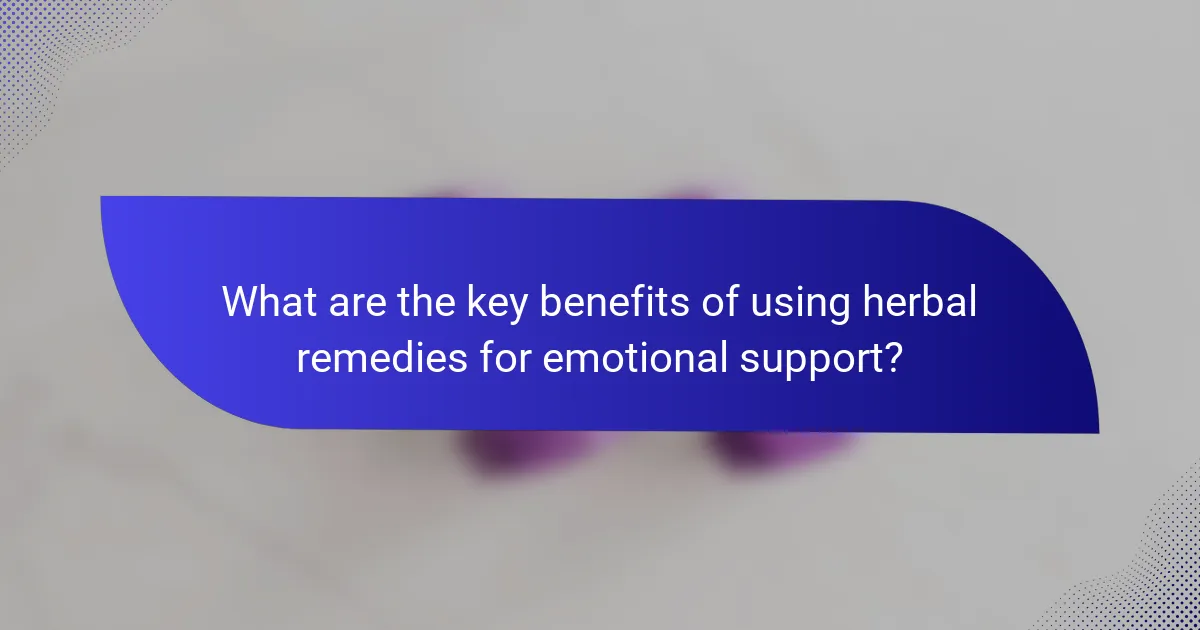
What are the key benefits of using herbal remedies for emotional support?
Herbal remedies provide various benefits for emotional support, particularly in managing anxiety. These natural solutions can enhance mood, reduce stress, and promote relaxation. Popular herbs like chamomile and lavender are known for their calming effects, while ashwagandha may help lower cortisol levels. Additionally, herbal remedies often have fewer side effects compared to conventional medications, making them a preferred choice for many seeking emotional relief. Their holistic approach can also support overall well-being, addressing both mental and physical health.
Which herbs are known for their calming effects?
Herbs known for their calming effects include chamomile, lavender, valerian root, passionflower, and lemon balm. These herbs are commonly used in herbal remedies for anxiety management and emotional support due to their ability to promote relaxation and reduce stress. Chamomile is often consumed as tea and is praised for its mild sedative effects. Lavender, used in essential oils and aromatherapy, is known for its soothing aroma. Valerian root is recognized for its potential to improve sleep quality. Passionflower is noted for its calming properties, while lemon balm is valued for its ability to alleviate anxiety symptoms.
What role do adaptogens play in herbal anxiety management?
Adaptogens play a crucial role in herbal anxiety management by helping the body adapt to stress. They regulate cortisol levels and enhance resilience, promoting emotional stability. Common adaptogens like ashwagandha and rhodiola rosea have shown effectiveness in reducing anxiety symptoms. These herbs also support overall mental health, making them valuable in herbal remedies for anxiety management.
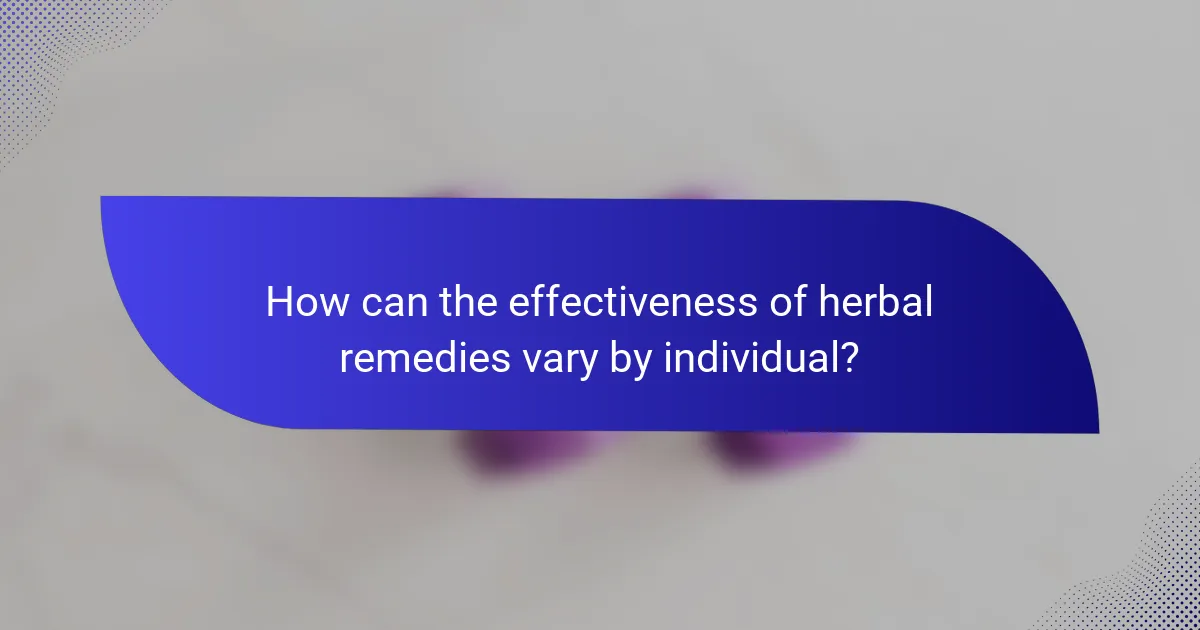
How can the effectiveness of herbal remedies vary by individual?
The effectiveness of herbal remedies for anxiety management can vary significantly among individuals. Factors such as genetics, metabolism, and existing health conditions influence how one responds to specific herbs.
For example, some individuals may find chamomile effective for relaxation, while others may not experience the same benefits. The root attribute of herbal remedies is their natural origin, but unique attributes like individual tolerance levels and lifestyle choices can lead to different outcomes.
Moreover, rare attributes such as allergies or interactions with medications can further affect effectiveness. Understanding these variations helps tailor herbal approaches to individual needs, enhancing emotional support and anxiety management.
What factors influence the response to herbal treatments?
Several factors influence the response to herbal treatments for anxiety management. These include individual body chemistry, dosage, the specific herbal remedy used, and potential interactions with other medications.
Body chemistry varies among individuals, affecting how they metabolize herbal ingredients. Dosage plays a crucial role; too little may be ineffective, while too much can lead to adverse effects. The specific herbal remedy, such as chamomile or valerian root, has unique properties that contribute to its effectiveness. Lastly, interactions with other medications can alter the efficacy of herbal treatments, necessitating careful consideration of a person’s overall health regimen.
How do personal health conditions affect herbal remedy outcomes?
Personal health conditions significantly influence the effectiveness of herbal remedies for anxiety management. Individual factors, such as metabolic rate, existing medical conditions, and medication interactions, can alter how these remedies work. For example, a person with liver issues may process herbal compounds differently, potentially reducing their efficacy. Additionally, unique attributes like allergies or sensitivities can lead to adverse reactions, impacting overall outcomes. Understanding these factors is crucial for optimizing the use of herbal remedies tailored to individual health profiles.

What are some lesser-known herbs with potential anxiety-relieving properties?
Several lesser-known herbs may help relieve anxiety, including ashwagandha, lemon balm, holy basil, and passionflower. These herbs possess unique properties that can promote relaxation and emotional balance.
Ashwagandha is an adaptogen that may reduce cortisol levels, thus alleviating stress. Lemon balm has calming effects and can improve sleep quality. Holy basil is known for its ability to enhance mood and reduce anxiety. Passionflower is often used for its sedative properties, which can help with insomnia and anxiety relief.
Incorporating these herbs into your routine may provide natural support for anxiety management. Always consult a healthcare professional before starting any new herbal regimen.
How does the preparation method impact the efficacy of herbal remedies?
The preparation method significantly impacts the efficacy of herbal remedies for anxiety management. Different methods can alter the bioavailability and potency of active compounds.
For instance, herbal teas often extract different properties compared to tinctures or capsules. Teas may provide immediate relief due to rapid absorption, while tinctures can offer a more concentrated dose.
Additionally, factors such as temperature and steeping time can influence the extraction of beneficial compounds. This variability highlights the importance of selecting an appropriate preparation method to enhance the desired effects of herbal remedies.
Understanding these nuances can lead to more effective use of herbal remedies for emotional support.
Which rare herbs have shown promise in recent studies?
Recent studies have highlighted several rare herbs that show promise for anxiety management and emotional support. These include Rhodiola rosea, which reduces fatigue and enhances mood; Ashwagandha, known for its stress-relieving properties; and Holy Basil, which may lower cortisol levels. Each herb has unique attributes contributing to emotional well-being, making them valuable additions to herbal remedies for anxiety.
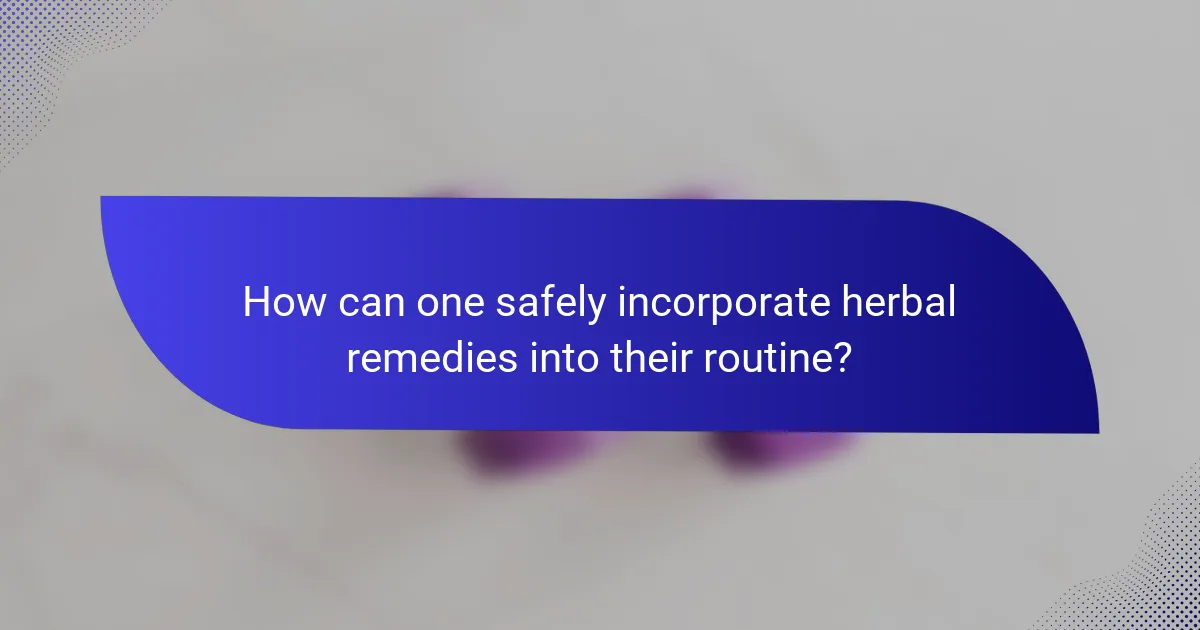
How can one safely incorporate herbal remedies into their routine?
To safely incorporate herbal remedies into your routine, start by consulting a healthcare professional. Gradually introduce one remedy at a time to monitor effects and avoid interactions. Choose high-quality products from reputable sources to ensure safety. Document your experiences to track benefits or side effects, adjusting usage as necessary.
What are the best practices for using herbal remedies for anxiety?
To effectively use herbal remedies for anxiety, follow best practices that enhance safety and efficacy. Start by consulting a healthcare professional to ensure compatibility with your health conditions and medications. Choose high-quality herbs, such as chamomile or lavender, known for their calming properties. Monitor dosage carefully, as effectiveness can vary among individuals. Gradually incorporate remedies into your routine, allowing time to assess their impact. Maintain a journal to track your experiences and adjust as needed. Lastly, combine herbal remedies with lifestyle changes like mindfulness and exercise for optimal results.
What common mistakes should be avoided when using herbal treatments?
When using herbal treatments for anxiety management, avoid common mistakes to ensure safety and effectiveness.
1. Ignoring professional advice can lead to interactions with medications or underlying health conditions.
2. Overlooking proper dosage may reduce effectiveness or cause adverse effects.
3. Failing to research the specific herb’s properties can result in choosing ineffective or unsuitable remedies.
4. Assuming all herbal remedies are safe can lead to unexpected side effects or allergic reactions.
5. Neglecting to monitor personal reactions can prevent timely adjustments or discontinuation of treatment.
How can individuals monitor their progress while using herbal remedies?
Individuals can monitor their progress with herbal remedies by tracking symptoms, dosage, and emotional responses. Start a journal to note daily experiences and any changes in anxiety levels.
Regularly evaluate the effectiveness of each remedy. Consider using a scale from 1 to 10 to assess anxiety before and after using the herbal remedy. This quantifiable approach helps identify what works best.
Engaging in self-reflection enhances the monitoring process. Ask yourself how you feel mentally and emotionally after a specific duration. This unique attribute of self-assessment can reveal patterns over time.
Consult with a healthcare professional for guidance. They can provide insights on adjusting dosages or combining remedies effectively. Their expertise ensures a safe and informed approach to herbal anxiety management.
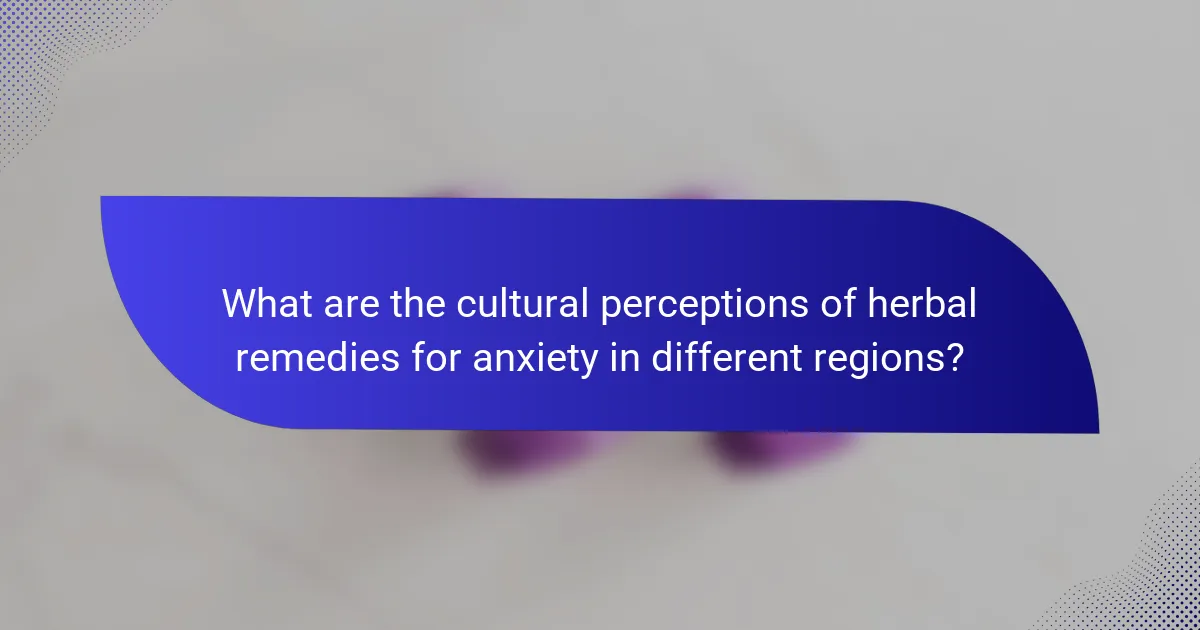
What are the cultural perceptions of herbal remedies for anxiety in different regions?
Cultural perceptions of herbal remedies for anxiety vary significantly across regions. In Asia, traditional practices like Ayurveda and Traditional Chinese Medicine emphasize holistic approaches, often integrating herbs like ashwagandha and chamomile. In contrast, Western cultures may view these remedies with skepticism, favoring pharmaceutical solutions, although interest in natural alternatives is growing. Indigenous cultures often regard herbal remedies as sacred, using them in spiritual and healing rituals, which enhances their value. The acceptance and usage of these remedies depend on cultural beliefs, health education, and access to resources, influencing their effectiveness and popularity.
How do herbal remedy preferences differ across various populations?
Herbal remedy preferences for anxiety management vary significantly across populations. Cultural beliefs and availability influence these choices. For instance, Western populations may favor chamomile and valerian root, while Eastern populations might prefer ashwagandha and kava. Additionally, age and lifestyle factors play a role; younger individuals often seek modern herbal blends, whereas older adults may rely on traditional remedies. Access to information and healthcare systems also shapes preferences, leading to diverse approaches in managing anxiety through herbal solutions.
What traditional practices influence the use of herbal remedies for emotional support?
Traditional practices significantly shape the use of herbal remedies for emotional support. Many cultures have long relied on plants like chamomile and lavender for their calming effects. These remedies are often integrated into rituals or daily routines, enhancing their perceived effectiveness. For instance, indigenous tribes may use sage for purification, promoting emotional balance. Historical texts frequently document the use of specific herbs for anxiety, reinforcing their cultural significance.
How can understanding cultural contexts enhance the effectiveness of herbal treatments?
Understanding cultural contexts enhances herbal treatments’ effectiveness by aligning remedies with traditional practices and beliefs. Cultural knowledge informs the selection of herbs, dosage, and preparation methods, optimizing their impact on anxiety management and emotional support. For instance, some cultures may favor specific herbs like chamomile or ashwagandha based on historical use and perceived benefits. This alignment can increase patient trust and adherence to treatment, leading to better outcomes. Additionally, cultural sensitivity allows practitioners to tailor approaches, respecting individual preferences and enhancing the therapeutic relationship.
What are expert recommendations for selecting herbal products?
Select herbal products based on quality, safety, and efficacy. Look for products with third-party testing, clear labeling, and reputable sourcing.
1. Check for certifications like USDA Organic or Non-GMO Project Verified.
2. Research the specific herbs for their documented benefits and potential side effects.
3. Consult with a healthcare provider to ensure compatibility with existing conditions or medications.
4. Read customer reviews to gauge effectiveness and satisfaction.